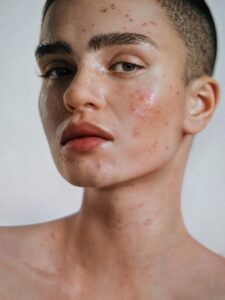Managing Acne and Oily Skin in Humid Weather
The onset of warmer months brings with it a rise in humidity levels, impacting our skin in significant ways. Dealing with oily skin in humid weather can lead to the dreaded acne. For those with oily or acne-prone skin, humid weather can be particularly challenging. As an esthetician, understanding how humidity and heat affect the skin is crucial in helping clients manage their skin conditions effectively. This article explores the connection between humidity and acne breakouts, and offers insights into maintaining healthy skin during humid conditions.
Understanding Humidity and Its Effects on Skin
Humidity refers to the amount of moisture present in the air. In high humidity conditions, such as during a humid summer, the air is saturated with water vapor, which can lead to a variety of skin problems. When exposed to high humidity, the skin often becomes more oily as it attempts to balance its hydration levels. This can result in a greasy complexion, especially for those with oily skin. Understanding your skin type and how it reacts to humid weather is the first step in managing its effects.
What is Humidity?
Humidity is essentially the measurement of water vapor in the air. It plays a crucial role in the skin’s behavior, especially in humid weather. When the humidity is high, the air tends to hold more moisture, which can lead to the skin feeling sticky or greasy. This environment is often challenging for those with oily or acne-prone skin as it can exacerbate existing conditions, leading to an increased likelihood of breakouts and clogged pores. Keeping track of humidity levels can help in choosing appropriate skin care products.
How Humidity Affects Your Skin
Humidity affects your skin by altering its moisture balance. In humid conditions, the skin may produce excess oil, attempting to protect itself from drying out. However, this can strip your skin of its natural oils, causing it to become oily and shiny. For sensitive skin, this may lead to irritation or exacerbate acne. It’s important to wash your face twice a day to manage oily skin and prevent clogged pores. Using products tailored to your skin type can help prevent breakouts.
The Connection Between Humidity and Acne Breakouts
The relationship between humidity and acne is significant. High humidity causes the skin to produce more oil, which can mix with dead skin cells and bacteria on the skin, contributing to acne breakouts. Maintaining skin health is crucial in humid weather, as the conditions can lead to breakouts if not managed properly. Regularly washing your face and using non-comedogenic products can help keep your skin looking clear. Keeping the skin hydrated without over-moisturizing is key to managing acne in humid weather.
Identifying Skin Types in Humid Weather

Photo by Rahul Pandit on Pexels
Understanding your skin type is essential when navigating the challenges presented by humid weather. Humid conditions can significantly impact how your skin behaves, making it crucial to recognize the signs of various skin types to tailor your skin care routine effectively. Whether you have oily, dry, or sensitive skin, identifying your skin type allows your skin to be managed better during humid summers, helping to maintain its health and appearance.
Oily Skin vs. Dry or Dehydrated Skin
In humid weather, oily skin tends to become more pronounced as the combination of heat and humidity causes your skin to produce excess oil. This can lead to a shiny complexion and increase the likelihood of acne breakouts. On the other hand, dry or dehydrated skin may seem less apparent, as the moisture in the air can temporarily relieve dryness. However, it’s crucial to keep your skin hydrated, as high humidity can still strip your skin of its natural oils, leading to an unbalanced skin condition.
Recognizing Sensitive Skin in Humid Conditions
Sensitive skin in humid conditions can be tricky, as the added moisture might exacerbate irritation or redness. Humidity levels can cause skin problems for sensitive types, leading to inflammation or a more pronounced reaction to skin care products. As an esthetician, it’s important to help clients recognize these signs and recommend products that are gentle and tailored to their skin type. Keeping the skin calm and protected from environmental stressors is essential to prevent breakouts and maintain skin health.
Assessing Your Skin Condition During Humid Summers
Assessing your skin condition during humid summers involves paying attention to how your skin reacts to changes in humidity. Humid weather may lead to breakouts for those with oily or acne-prone skin, while dry skin types might notice an increased need for moisturization. Regularly wash your face twice a day and consider using non-comedogenic, lightweight skin care products to help prevent clogged pores and manage oily skin effectively. Understanding your skin’s needs will help maintain its health and vitality throughout the season.
Tips to Manage Oily Skin in Humid Weather

Photo by Shiny Diamond on Pexels
Daily Skin Care Routine for Oily Skin
Developing a consistent skin care routine is crucial for managing oily skin in humid weather. Start by washing your face twice daily with a gentle, non-comedogenic cleanser to remove excess oil and dead skin cells. Follow with a toner to help balance your skin’s pH levels and prevent clogged pores. It’s important to use a lightweight, oil-free moisturizer to keep your skin hydrated without adding extra oil. Tailoring your routine to your skin type will help maintain healthy skin.
Products to Wash Your Face in Humid Climates
Choosing the right products to wash your face in humid climates can significantly impact your skin health. Opt for cleansers that are formulated for oily or acne-prone skin, as they are designed to remove excess oil while preserving the skin’s natural moisture. Look for ingredients like salicylic acid or benzoyl peroxide, which can help prevent acne breakouts by keeping pores clear of bacteria and dead skin cells. Selecting the right products allows your skin to stay clean and refreshed.
Hydration Strategies for Acne-Prone Skin
Keeping skin hydrated is essential, even for acne-prone skin, especially in high humidity. Use a lightweight, non-comedogenic moisturizer that provides hydration without clogging pores. Consider incorporating a hydrating serum containing hyaluronic acid, which helps lock in moisture without adding oil. Drinking plenty of water and maintaining a healthy diet will also support your skin’s hydration from the inside out, reducing the risk of breakouts and ensuring your skin looks its best.
Preventing Acne Breakouts in Humidity

Photo by Galina Kondratenko on Unsplash
Best Practices for Skin Care in Humid Weather
To prevent acne breakouts in humid weather, adopt best practices that cater to your skin type. Regularly wash your face, especially after sweating, to eliminate oil, bacteria, and impurities. Avoid heavy makeup that can contribute to clogged pores and instead choose breathable options. Use sunscreen daily to protect your skin from UV damage, opting for formulas that are non-comedogenic. Implementing these best practices will help prevent skin problems and keep your skin looking clear and healthy.
How to Maintain a Balanced Skin Environment
Maintaining a balanced skin environment in humid conditions involves understanding your skin’s needs. Use products that regulate oil production without stripping your skin of its natural oils. Incorporate exfoliation into your routine to remove dead skin cells, but do so sparingly to prevent irritation. Applying a clay mask weekly can help absorb excess oil and purify pores. Balancing your skin’s environment will protect your skin and help prevent breakouts, keeping it healthy and radiant.
When to Seek Professional Advice
If persistent acne breakouts occur despite a diligent skin care routine, it may be time to seek professional advice. An esthetician can analyze your skin condition and recommend treatments or products tailored to your needs. While estheticians cannot provide medical treatment, they can offer valuable insights and guidance on managing oily or acne-prone skin in humid weather. Seeking professional advice ensures you have the right tools and knowledge to keep your skin healthy and prevent future acne issues.


